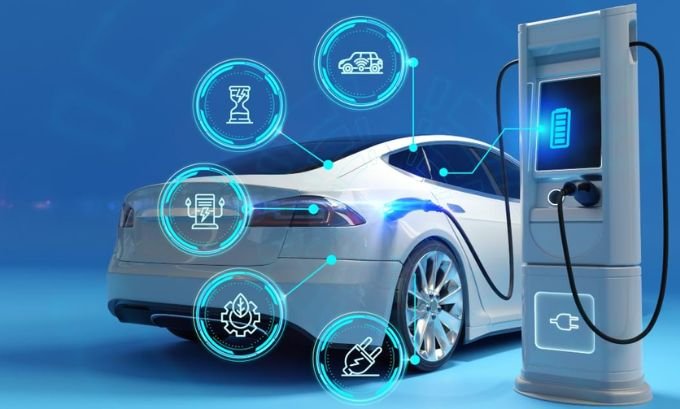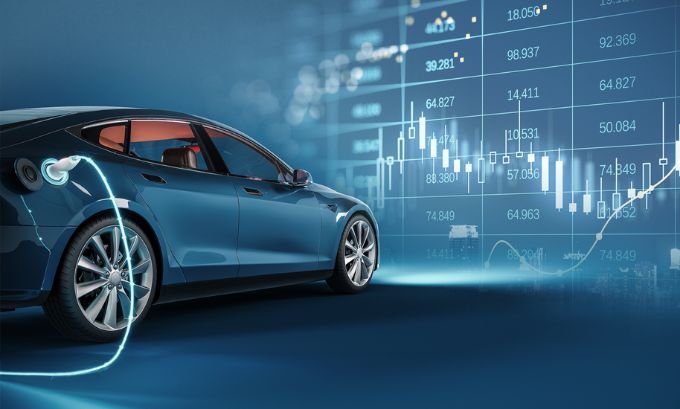Electric vehicles (EVs) are quickly moving from a novelty to a common sight on our streets.# The Pros and Cons of Electric Vehicles: An Honest Review
Electric vehicles (EVs) are quickly moving from a novelty to a common sight on our streets. They offer an exciting vision of the future with instant acceleration, silent driving, and zero tailpipe emissions. However, deciding to buy one involves looking closely at the pros and cons of electric vehicles. While the benefits include major savings on fuel and maintenance, the drawbacks, like higher initial costs and charging logistics, are still significant factors.
This detailed guide provides an honest, experience-based look at what it’s like to own an Electric Vehicle today. We’ll dive into everything from daily driving and road trips to the complexities of battery technology, giving you the clarity needed to make a smart choice.
Table of Contents
A Clear Look at the Pros and Cons of Electric Vehicles
Is now the right time for you to switch to an EV? The answer lies in your priorities. For many, the quiet ride and lower operating costs make it an undeniable upgrade. For others, concerns about range, charging availability, and the upfront investment are valid reasons to hesitate. Let’s explore both sides of the coin.
My Personal Journey with an Electric Vehicle
A couple of years back, my family swapped our trusty gasoline SUV for a new Kia EV6. This move was a mix of excitement and practical learning. The most immediate change was the incredible ease of home charging. After installing a Level 2 home charger, we began each day with a full battery, completely eliminating our weekly gas station runs. This simple shift saved us about $1,700 in fuel costs in the first year alone.
The driving experience itself was a game-changer. The instant power made navigating city traffic feel effortless and fun. Highway driving became a more serene experience without the constant hum of an engine. We even embarked on several long road trips, which introduced us to the planning side of EV ownership. Using apps, we mapped our routes between DC fast chargers, typically stopping for about 30 minutes to add another 200 miles of range.
On one journey through a less-developed charging corridor, we rented a Tesla Model 3. The experience highlighted the superiority of the Tesla Supercharger Network, which was faster and far more reliable than other public Charging Infrastructure we had encountered. This hands-on experience taught me that while EV ownership offers huge rewards, it requires a new way of thinking about travel.

What I Like: The Clear Strengths of EV Ownership
Drawing from my own experience and extensive industry data, here are the most compelling advantages of going electric.
- Significant Reduction in Running Costs: Electricity is consistently cheaper per mile than gasoline. This finding is backed by data from the U.S. Department of Energy and is something I’ve confirmed with my own budget. The simple mechanical design of EVs, with fewer moving parts, also eliminates oil changes and drastically reduces brake wear, leading to lower maintenance bills.
- An Unmatched Driving Experience: The immediate acceleration and silent operation of an EV are truly remarkable. High-performance models like the Porsche Taycan or Lucid Air offer supercar-level speed, but even mainstream EVs like the Ford Mustang Mach-E provide a smooth, powerful, and deeply engaging ride.
- Zero Tailpipe Emissions: A key environmental benefit is that EVs produce no direct emissions. This helps improve air quality in our towns and cities, playing a vital role in reducing public health issues linked to pollution and combating climate change.
- Valuable Financial Incentives: The Federal Electric Car Tax Credit can provide up to $7,500 in savings on eligible new vehicles, significantly lowering the barrier to entry. Additionally, many state and local governments offer their own rebates for both the car and the installation of a home charging station.
Areas for Improvement: The Current Disadvantages
A balanced look at the pros and cons of electric vehicles must also address the existing challenges.
- High Initial Purchase Price: EVs still generally cost more upfront than comparable Internal Combustion Engine (ICE) Vehicles. Luxury models like the GMC Hummer EV and Rivian R1S are priced at a premium, and even more accessible models can be a financial stretch for many households despite available tax credits.
- Range Anxiety and Charging Logistics: Although most new EVs offer a practical range of 250-350 miles, “range anxiety” is a real concern for drivers who frequently travel long distances. The public Charging Infrastructure is expanding, but it hasn’t reached the universal coverage of gas stations, and charger reliability outside the Tesla Supercharger Network can be hit-or-miss.
- Charging Time on the Road: A stop at a DC fast charger for 30-40 minutes is a significant time commitment compared to a five-minute gasoline fill-up. While manageable, these stops can prolong travel times on long journeys. Home charging is convenient for daily use but requires overnight planning.
- Cold Weather Performance Impact: EV batteries are sensitive to cold. In freezing temperatures, it is common for an EV’s range to decrease by 20-30%. The battery has to use energy to keep itself warm and heat the cabin, a critical consideration for anyone living in a colder climate.
- Battery Production and Recycling Concerns: The “green” credentials of EVs come with a caveat. The process of Battery Production and Recycling depends on mining raw materials like lithium and cobalt, which has its own environmental and ethical challenges. While an EV’s total lifetime emissions are lower than a gas car’s, its manufacturing footprint is currently larger. The industry is actively researching new battery chemistries and scaling up recycling efforts to address this.
Comparison: Electric Vehicles vs. ICE Vehicles
This table provides a clear, at-a-glance summary of the pros and cons of electric vehicles compared to their gasoline counterparts.
| Feature | Electric Vehicles (EVs) | Internal Combustion Engine (ICE) Vehicles |
|---|---|---|
| Energy Efficiency | High (87–91% transfer to wheels, per the U.S. Department of Energy) | Low (16–25% of fuel energy is used for motion) |
| Running Costs | Lower (stable electricity costs, minimal maintenance) | Higher (volatile fuel prices, routine engine servicing) |
| Purchase Price | Generally higher, but reduced by incentives like the Federal Electric Car Tax Credit | Generally lower initial cost |
| Refueling/Charging Time | 30-40 mins for ~80% at a DC fast charger; 8-10 hours for a full charge at home | 5 minutes to fill the tank at a gas station |
| Driving Range | 250-350 miles on average | 350-500+ miles on average |
| Performance | Instant, silent acceleration | Delayed power delivery with engine noise and vibration |
| Environmental Impact | Zero tailpipe emissions; lifecycle impact tied to Battery Production and Recycling | Direct tailpipe emissions; lifecycle impact from oil drilling |
| Infrastructure | Growing Charging Infrastructure, led by reliable networks like the Tesla Supercharger Network | Mature and widespread gas station network |

Frequently Asked Questions (FAQ)
Here are straightforward answers to some of the most common questions about EVs.
1. Are electric cars cheaper to own in the long run?
Yes, for most drivers. Although the upfront cost is higher, the substantial savings on fuel and reduced maintenance often result in a lower total cost of ownership over a 5-to-10-year period.
2. How long will an EV battery last?
Most automakers provide a battery warranty for 8 years or 100,000 miles. Real-world data suggests that modern batteries will retain excellent health for 150,000 to 200,000 miles or more.
3. Can I own an EV if I live in an apartment?
It’s more feasible than ever but depends on your charging access. If your building offers resident charging or if there is reliable public charging nearby, it can work well. Many new residential buildings are now including Level 2 home chargers as an amenity.
4. How do EVs handle in snow and cold weather?
They handle very well, often better than gas cars, due to their heavy weight and low center of gravity improving traction. The main trade-off is a noticeable reduction in driving range in freezing temperatures.
5. Which EV model should I consider?
The best model depends on your lifestyle. For cutting-edge technology and long range, a Tesla Model S or Lucid Air is a top choice. For a great mix of value and practicality, the Kia EV6 and Ford Mustang Mach-E are excellent. For adventure, the Rivian R1S leads the pack. For an affordable and reliable commuter, the Hyundai Kona Electric is a popular option.
6. How reliable is the public charging network?
It is improving quickly. The Tesla Supercharger Network remains the benchmark for reliability and ease of use. Other networks are expanding but can sometimes have issues with broken or occupied stations, making trip planning essential.
7. Are EVs genuinely better for the environment?
Yes, when analyzing the entire lifecycle. While Battery Production and Recycling has an environmental cost, the total lifetime emissions of an EV are significantly lower than an Internal Combustion Engine (ICE) Vehicle, especially as more of our electricity comes from renewable sources.
Conclusion: Is It Your Time to Go Electric?
The conversation about the pros and cons of electric vehicles has shifted from a future possibility to a present-day reality. For many, EVs already offer a superior driving experience, lower ownership costs, and a way to reduce their environmental impact.
The final decision, however, is personal. It requires you to assess your daily driving needs, your access to charging, your budget, and your appetite for a new way of managing your vehicle. For some, the benefits are too great to ignore. For others, it may be wiser to wait another year or two as the technology and Charging Infrastructure continue to advance.
The best way to decide is to get behind the wheel. Test drive a few different models to feel the difference for yourself. Your next car could very well be electric.
Just like driving an EV promotes sustainability, you can shop eco-conscious essentials at Tokyo Mart, your trusted source for green living products.
References:
- U.S. Department of Energy (DOE), Office of Energy Efficiency & Renewable Energy: energy.gov
- U.S. Internal Revenue Service (IRS): Credits for New Clean Vehicles Purchased in 2023 and After
- Environmental Protection Agency (EPA): Green Vehicle Guide
- International Energy Agency (IEA): Global EV Outlook 2024


